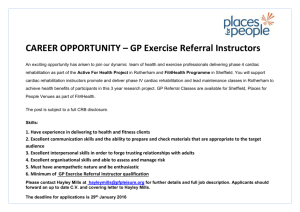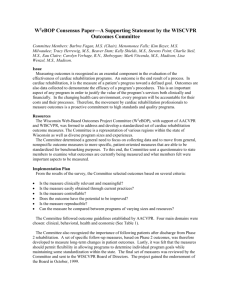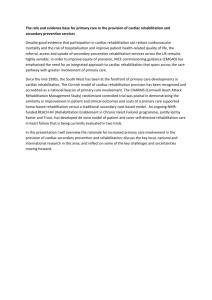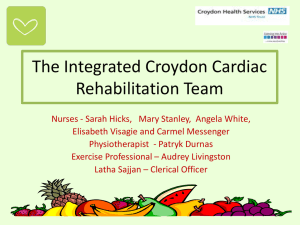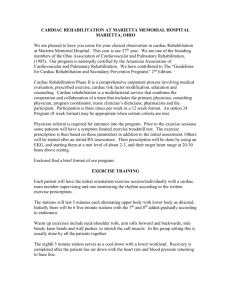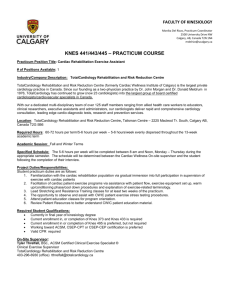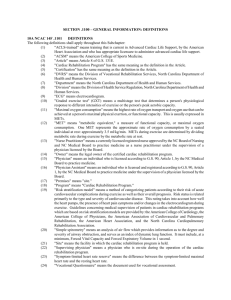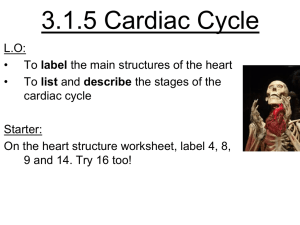Heart Failure - Fort Sanders Regional Medical Center
advertisement
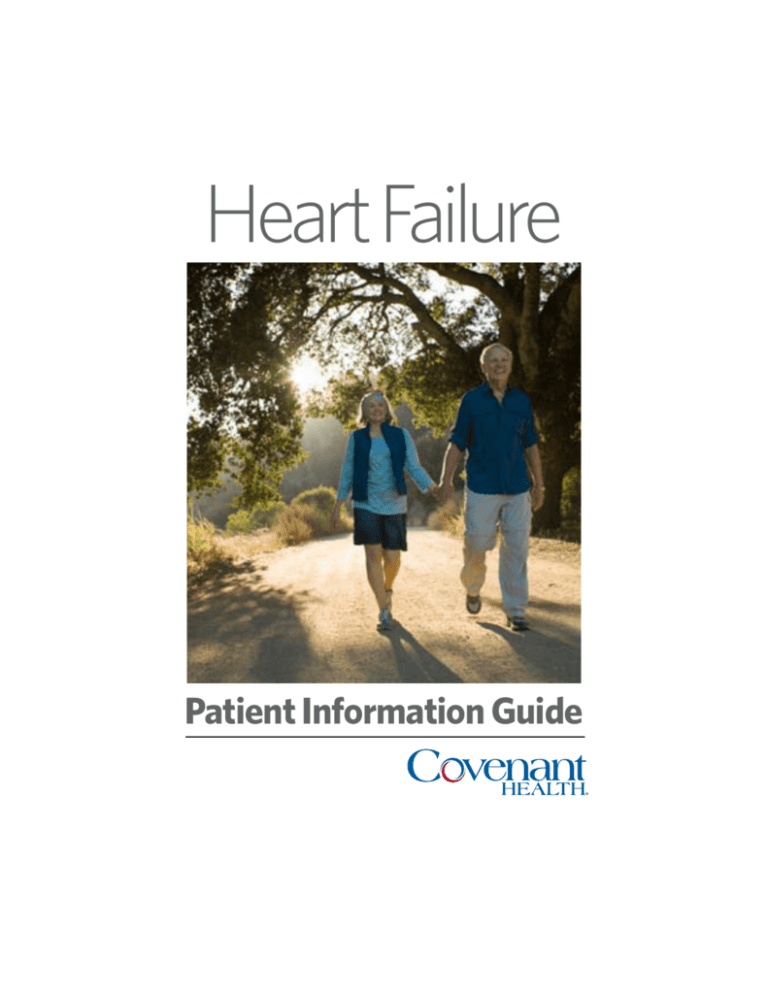
Heart Failure Patient Information Guide Heart Failure Patient Information Guide Contents Heart Anatomy . . . . . . . . . . . . . . . . . . . . . . . . . . . . . . . . . . . . . . . . . . . . . . . . . . . . . . . 2 About Heart Failure . . . . . . . . . . . . . . . . . . . . . . . . . . . . . . . . . . . . . . . . . . . . . . . . . . . . 3 Symptoms and Diagnosis . . . . . . . . . . . . . . . . . . . . . . . . . . . . . . . . . . . . . . . . . . . . . . 4 Treatment for Heart Failure . . . . . . . . . . . . . . . . . . . . . . . . . . . . . . . . . . . . . . . . . . . . . 6 Cardiac Rehabilitation . . . . . . . . . . . . . . . . . . . . . . . . . . . . . . . . . . . . . . . . . . . . . . . . . 7 Living Well with Heart Failure . . . . . . . . . . . . . . . . . . . . . . . . . . . . . . . . . . . . . . . . . . 8 Covenant Health Resources . . . . . . . . . . . . . . . . . . . . . . . . . . . . . . . . . . . . . . . . . . . 10 Tracking Tools for Patients . . . . . . . . . . . . . . . . . . . . . . . . . . . . . . . . . . . . . . . . . . . . . 12 Page 1 Heart Failure Patient Information Guide Heart Anatomy The heart is a muscle that supplies the body with blood and oxygen. The muscles, tissues, and organs of the body need oxygen to function. The heart consists of four chambers: • The upper chambers are called atria, and the lowers chambers are called ventricles. • The right side of the heart receives blood from the body through the veins and pumps the blood to the lungs. • The left side of the heart receives oxygenated blood back from the lungs. This oxygenated blood will pump to the rest of the body to feed organs and tissues. • The left ventricle has to pump through the entire body, so it is stronger than the right ventricle. The left ventricle is the heart’s pumping power. Page 2 Heart Failure Patient Information Guide About Heart Failure How does heart failure affect the body? Heart failure is a chronic condition in which the heart cannot pump enough oxygenated blood to meet the needs of the body’s other organs. The heart keeps pumping, but not as efficiently as a healthy heart. Usually, the loss in the heart’s pumping action is a symptom of an underlying heart problem. Nearly 5.7 million Americans are living with heart failure, and 670,000 new cases are diagnosed each year. Heart failure interferes with the kidney’s normal function of eliminating excess sodium and waste from the body. In congestive heart failure, the body retains more fluid, often resulting in swelling of the ankles and legs. Fluid also collects in the lungs, resulting in shortness of breath. Types of Heart Failure Left-sided heart failure – The left ventricle supplies most of the heart’s pumping power, so it’s larger than the other chambers and essential for normal function. In left-sided heart failure, the left side of the heart must work harder to pump the same amount of blood. Systolic failure – The left ventricle loses its ability to contract normally. The heart can’t pump with enough force to push enough blood into circulation. Diastolic failure – The left ventricle loses its ability to relax normally (because the muscle has become stiff). The heart can’t properly fill with enough blood during the resting period between each beat. Heart failure is a heart condition requiring medical attention and oversight, along with the patient’s participation in managing symptoms and seeking appropriate care. What causes heart failure? Heart failure may result from any/all of the following: • heart valve disease - caused by past rheumatic fever or other infections • high blood pressure (hypertension) • infections of the heart valves and/or heart muscle (i.e., endocarditis) • scar tissue from previous heart attacks may interfere with the heart muscle’s ability to work normally • coronary artery disease – narrowed arteries that supply blood to the heart muscle • cardiomyopathy – disease of the heart muscle • congenital heart disease/defects (present at birth) • cardiac arrhythmias (irregular heartbeats) • chronic lung disease and pulmonary embolism • drug-induced heart failure • excessive sodium intake • hemorrhage and anemia • diabetes Right-sided heart failure – When the left ventricle fails, increased fluid pressure is, in effect, transferred back through the lungs, ultimately damaging the heart’s right side. When the right side loses pumping power, blood backs up in the body’s veins. Page 3 Heart Failure Patient Information Guide Symptoms and Diagnosis What are the symptoms of heart failure? Clinical signs of heart failure can include weakness, shortness of breath, enlarged neck veins, and an enlarged liver. Below are common symptoms of heart failure. However, each individual may experience symptoms differently. Symptoms may include: • shortness of breath during rest, exercise, or lying flat • weight gain • visible swelling of the legs and ankles (because of a build-up of fluid), and, occasionally, the abdomen • Electrocardiogram (ECG or EKG) • fatigue and weakness A test that records the electrical activity of the • loss of appetite, nausea, and abdominal pain heart, shows abnormal rhythms (arrhythmias or • persistent cough - often produces mucus or dysrhythmias), and detects heart muscle damage. blood-tinged sputum • reduced urination • Stress Test (usually with ECG; also called treadmill or exercise ECG) The severity of the condition and symptoms A test that is given while a patient walks on a depends on how much of the heart’s pumping treadmill or pedals a stationary bike to monitor capacity has been lost. the heart during exercise. Breathing and blood The symptoms of heart failure may resemble other pressure rates are also monitored. A stress test conditions or medical problems. Always consult may be used to detect coronary artery disease, your physician for a diagnosis. and/or to determine safe levels of exercise following a heart attack or heart surgery. How is Heart Failure Diagnosed? • Echocardiogram (also known as an “echo”) In addition to a complete medical history and A noninvasive test that uses sound waves to physical examination, diagnostic procedures produce a study of the motion of the heart’s for heart failure may include a chest x-ray, chambers and valves. The echo sound waves echocardiogram, electrocardiogram (ECG or EKG), create an image on the monitor as an ultrasound or BNP testing. transducer is passed over the heart. New and advanced diagnostic tests and tools are • Transesophageal Echocardiogram (TEE) constantly being introduced to further understand A test in which a small transducer is passed down the complexity of disease, injury, and congenital the esophagus to provide a clearer image of heart or acquired abnormalities. The following are structures. just a few of the diagnostic tests that have been used/are being used to further understand and • BNP testing identify cardiovascular disease. For more specific B-type natriuretic peptide (BNP) is a hormone information, consult your cardiologist or physician. released from the ventricles in response to increased wall tension (stress) that occurs • Chest x-ray with heart failure. BNP levels rise as wall stress A diagnostic test which uses invisible increases. BNP levels are useful in the rapid electromagnetic energy beams to produce images evaluation of heart failure. The higher the BNP of internal tissues, bones, and organs onto film. levels, the worse the heart failure. Lab work will be The x-ray can show if the heart is larger than done to test BNP levels. normal and help detect fluid in the lungs. Page 4 Heart Failure Patient Information Guide • Cardiac Catheterization (also called Coronary • Ejection Fraction Angiogram) Ejection fraction is a measurement of the total A test in which a small catheter (hollow tube) is amount of blood the left ventricle pumps out guided through a vein or artery into the heart. Dye with each beat. The ejection fraction may be is given through the catheter, and moving x-ray lower when the heart is damaged because of a pictures are made as the dye travels through the heart attack or diseased heart. A normal ejection heart. This comprehensive test shows narrowings fraction is 50-70%. An assessment of the ejection in the arteries, outside heart size, inside chamber fraction is performed to assist in determining size, pumping ability of the heart, ability of the heart failure. valves to open and close, as well as measuring the • Holter Monitor pressures within the heart chambers and arteries. A small, portable, battery• Magnetic Resonance Angiography (MRA) of the powered ECG machine Heart worn by a patient to A specialized type of MRI procedure used to record heartbeats on evaluate blood vessels in the heart. tape over a period of 24 to 48 hours during normal activities. At the end of the time period, the monitor is returned to the physician’s office so the tape can be read and evaluated. A Holter monitor can help detect abnormal heartbeats. Page 5 Heart Failure Patient Information Guide Treatment for Heart Failure Specific treatment for heart failure will be determined by your physician based on: • your age, overall health, and medical history • extent of the disease • your tolerance for specific medications, procedures, or therapies • expectations for the course of the disease • your opinion or preference The cause of the heart failure will dictate the treatment protocol established. If the heart failure is caused by a valve disorder, then surgery is usually performed. If the heart failure is caused by a disease, such as anemia, then the disease is treated. And, although there is no cure for heart failure due to a damaged heart muscle, many forms of treatment have proven to be successful. The goal of treatment is to improve a person’s quality of life by making the appropriate lifestyle changes, daily symptoms monitoring and implementing drug therapy. Treatment of heart failure may include: • controlling risk factors • losing weight (if overweight) • restricting salt and fat from the diet • stopping smoking and tobacco use • abstaining from alcohol • proper rest and activity • controlling blood sugar if diabetic • controlling blood pressure • limiting fluids Medications are prescribed to help the heart beat easier, improve blood flow, and remove extra fluid. Common medications include: – angiotensin converting enzyme (ACE) inhibitors – to decrease the pressure inside the blood vessels and reduce resistance against which the heart pumps – angiotensin receptor blockers (ARB) – alternative medication for reducing workload on the heart if ACE inhibitors are not tolerated – diuretics – reduce the amount of fluid in the body – vasodilators – dilate the blood vessels and reduce workload on the heart – digitalis – increase heart strength and control rhythm problems – inotropes – increase the pumping action of the heart – antiarrhythmia medications – keep the rhythm regular and prevent sudden cardiac death – beta-blockers – reduce the heart’s tendency to beat faster, and reduce workload by blocking specific receptors on the cells of the heart – aldosterone blockers – block the effects of aldosterone, which causes sodium and water retention Common Procedures • Coronary Artery Bypass Graft (CABG): Bypass surgery can improve blood flow to the heart when there is a blockage in the coronary artery. • Heart Transplants: A heart transplant is a surgical procedure to remove a failing heart that can no longer meet the body’s demands and replace it with a healthier (donor) heart. Page 6 Heart Failure Patient Information Guide Cardiac Rehabilitation The cardiac rehabilitation team What is cardiac rehabilitation? Cardiac rehabilitation programs can be conducted while a person is a hospital inpatient or on an outpatient basis. Many skilled professionals are part of the cardiac rehabilitation team, including any of the following: • cardiologist / cardiovascular surgeon • physiatrist • internist • rehabilitation nurse • dietitian and nutritionist • physical therapist • occupational therapist • speech / language therapist • psychologist / psychiatrist • recreational therapist • audiologist • chaplain • vocational therapist Cardiac rehabilitation is a physician-supervised program for people who have either congenital or acquired heart disease. Cardiac rehabilitation can often improve functional capacity, reduce symptoms, and create a sense of well-being for patients. A physician may prescribe cardiac rehabilitation for a patient in certain situations, including heart failure. What conditions may benefit from cardiac rehabilitation? Conditions or cardiac procedures that might need cardiac rehabilitation may include: • angina pectoris • myocardial infarction (heart attack) • post-open heart surgery • post-heart transplantation • balloon angioplasty • stent placement • pacemaker • congenital heart disease • arrhythmias • rheumatic heart disease • heart failure The cardiac rehabilitation program A cardiac rehabilitation program is designed to meet the needs of the individual patient, depending upon the specific heart problem or disease, and should be supervised by a cardiac physician and a team of cardiac professionals. The program’s length may range from six weeks to a year or longer and will depend on your specific needs. The goal of cardiac rehabilitation is to help patients reverse their symptoms and maximize cardiac function. Cardiac rehabilitation includes, but is not limited to, the following activities: • establishing a progressive exercise program to build fitness and functional capacity • providing educational classes to help the patient change lifestyle habits as needed, such as smoking cessation or nutrition classes • offering stress management techniques and techniques to reduce anxiety • counseling and educating the patient about his/ her specific heart condition/disease and the best management approach for that specific condition • preparing the patient to return to work - equipping him/her to meet the physical and psychological demands of the job Page 7 Heart Failure Patient Information Guide Living Well with Heart Failure Heart failure (HF) occurs when the heart fails to pump enough blood. As mentioned previously heart failure is caused by diseases or conditions that damage or overwork the heart muscle. These can include uncontrolled coronary artery disease, high blood pressure, diseases of the heart valves, diseases of heart muscle, arrhythmias (abnormal heart beats), and diabetes. Current treatments and healthy habits may help reduce your symptoms and prolong your life. It’s important that you stick with your treatment, even when you’re feeling better. You also need to maintain the following healthy habits: See your doctor Weigh yourself every day Weigh yourself every morning after urinating and before eating. Keep record and take it with you on all doctor visits. Even an increase of a few pounds may mean that you’re retaining water and that your treatment may not be as effective as it could be. Signs and symptoms of fluid retention include increased shortness of breath; waking up in the middle of the night short of breath; increased swelling in hands, legs, and stomach; increased fatigue; and a frequent dry, hacking cough. Visit as often as your doctor recommends so that your treatment can be updated as needed. This is especially important if your medicine has been adjusted or if your condition changes. Don’t wait until your symptoms are so severe that you have to go to the hospital. Stop smoking One of the best things you can do for your overall health is to kick the habit. It’s not easy, but millions of people succeed every year. Tobacco tightens blood vessels and reduces the amount of oxygen in the blood. Visit the American Lung Association website at www.lungusa.org for more information. Talk with your doctor about ways to quit smoking. Skip the salt Limiting the amount of salt you eat can prevent fluid retention. This is important to control HF. Ask your doctor how much salt you can have. Don’t use salt when you cook or to season your food. Try using other spices, such as garlic powder or basil, instead. Take your medicines After a while you’ll get used to seasoning your food You need to take your medicines on schedule and in in new ways. You should also check the label of any the right amounts. Make sure you know how each prepared foods you buy. This can help you avoid one should affect your body. That way you will know high-salt foods. if it is working properly. If you have questions, ask your doctor. It’s part of your doctor’s job to help you understand how to take your medicines. Let him or her know if you have any side effects. Also let your doctor know about all the medicines you take, even over-the-counter products. They may interact with your HF medicines. Call your doctor if you gain 2-3 lbs. in one day or 5 lbs. in one week. Your doctor will tell you what to do next. Page 8 Heart Failure Patient Information Guide Fluid restriction Your doctor may advise you to limit the amount of fluids you eat and drink to help prevent fluid retention. A fluid is a food or liquid that melts at room temperature. Examples: ice cream, Jell-O™, tea, water, Popsicles™. • Keep a tally record of how much fluid you are taking daily. • Measure drinks by using a measuring cup. • Look at drink containers for the amount of fluid. • Chewing gum or sugarless hard candy can help keep mouth moist. • Frozen grapes or lemon wedges can help prevent thirst. Your fluids are limited to: ______ml =______cups =______ounces per day. Don’t drink alcohol Alcohol interferes with your heart’s ability to beat strongly. If your heart failure is advanced or if alcohol use caused your heart trouble, you must give it up completely. If you have mild or moderate heart failure not caused by alcohol, you may be able to drink limited amounts of alcohol. Ask your doctor if it is safe for you to drink any alcohol. If you think you have a problem with alcohol and need help quitting, talk with your doctor. You can also contact Alcoholics Anonymous. Look in the White Pages for a chapter near you, or visit the AA website at www.alcoholics-anonymous.org. frustration, and get support from family and friends. It’s also important to come to terms with your illness. This means accepting that you will need to make changes in your life in order to get better. If your feelings become overwhelming, consider seeking professional help. Ask your doctor to suggest a therapist who is experienced with cardiac patients. Or, you may want to join a local cardiac support group. It can help to talk with people who have had experiences like yours. Living successfully with HF takes effort and discipline. But many people do it, and so can you. Stick with your treatment and remember to practice good habits. Most of all, don’t give up. When to call your healthcare provider or home health agency Alert your doctor any time you notice a change in your body or your symptoms: Get active • Trouble breathing, especially during activity or In all but the most severe cases, low-intensity when lying flat in bed aerobic exercise helps people with HF, regardless • Waking up out-of-breath at night of their age. It can make your heart work better and • Weight gain increase of 2-3 pounds in one day or help your body use oxygen more efficiently. Exercise 5 pounds in one week also lessens your symptoms and improves your • Increased swelling of feet, ankles, legs, or sense of well being. Before you start exercising talk abdomen with your doctor about what level of exercise is right • Frequent dry, hacking cough, especially when lying for you. down • Extreme tiredness and fatigue Stay connected • Tightness or pain in your chest, arms, or jaw There are more ways you can help your treatment (CALL 911). work better. Avoid unnecessary anxiety and Page 9 Heart Failure Patient Information Guide Covenant Health Resources Covenant Health offers a variety of programs and services for persons with heart-related health issues, including heart failure. If you have questions about whether a specific service might be beneficial to you, call the contact number listed or contact Covenant Health at 865-541-4500, or visit www.covenanthealth.com. Heart Failure Programs Covenant Health offers a tele-management program for heart failure patients. This free service provides ongoing monitoring, education and support. We also offer a “Start Up” class and “HF Support Group” meetings. If you are discharged with a diagnosis of heart failure, you will receive a follow-up phone call to ask how you are doing and answer any questions you may have. Fort Sanders Regional Medical Center – 865-541-4933 Methodist Medical Center of Oak Ridge – 865-835-5225; e-mail: mmcheartfailure@covhlth.com Cardiopulmonary Rehabilitation Cardiopulmonary rehabilitation offers a safe exercise program for people with heart or respiratory conditions. A physician referral is required. Fort Loudoun Medical Center – 865-271-6030 Fort Sanders Regional Medical Center – 865-541-1250 LeConte Medical Center – 865-446-8500 Methodist Medical Center – 865-835-5235 Morristown-Hamblen Healthcare System – 423-522-4730 Covenant Diabetes Centers The Diabetes Centers offer clinical follow-up, education and support for patients with diabetes. A physician referral is required. Fort Sanders West – 220 Fort Sanders West Blvd., Medical Office Building 2, Suite 205, Knoxville, TN 37922, 865-531-5580 The Wellness Place at Methodist – 160 C West Tennessee Ave., Oak Ridge, TN 37830, 865-835-3790 Covenant Sleep Centers Your heart needs a good night’s rest to stay strong. Fifty percent of heart failure patients are prone to sleep disorders, so if you have sleep issues, talk to your doctor about scheduling a sleep study. If you already use a C-pap or B-pap, doing so can help keep your heart failure from progressing. Remember to bring it with you if you come to the hospital. Fort Sanders Sleep Disorders Center – 865-541-1375 LeConte Sleep Disorders Center – 865-446-7625 Methodist Sleep Diagnostic Center – 865-835-3810 Parkwest Medical Center – 865-531-5560 Parkwest Sleep Disorders Center – 865-373-1974 Roane Medical Center – 865-882-4142 Roane Medical Sleep Center – 865-882-0017 Page 10 Heart Failure Patient Information Guide Covenant HomeCare Geriatric Case Management Outpatient Program Covenant HomeCare offers home care and hospice services and rehabilitation therapies to patients in the comfort of the home environment. The Geriatric Case Management Outpatient Program (GCMOP) is a post-discharge case management program to cover frail elderly who have no other care oversight. Services are provided in the senior’s home after discharge to sustain or improve their quality of life. - 865-374-0465 For new patient referrals, call 865-374-0690 or toll free: 877-584-4663 Knoxville Office – 3001 Lake Brook Blvd., Suite 101, Knoxville, TN 37909, 865-374-0600 Aging Resource Center Helpline (ARCH) Are you a caregiver for an older family member? Multiple-role demands of caregiving, work, and home responsibilities can take their toll. Trying Oak Ridge Office – 200 New York Ave., Suite 230, to find balance can result in physical and mental Oak Ridge, TN 37830, 865-835-5065 fatigue, depression, emotional upsets, and increased job stress. The Aging Resource Center Toll free number for all clinics: 888-719-8087 Helpline can assist you with your role as an elder Covenant HomeCare serves these counties: caregiver, including: Anderson, Blount, Campbell, Cocke, Grainger, – Guiding you through questions and concerns Hamblen, Jefferson, Knox, Loudon, Monroe, – Suggesting alternatives to maximize your loved Morgan, Roane, Scott, Sevier and Union. one’s ability to remain at home – Providing timely information to assist you across Palliative Care Services the span of caregiving, from initial caregiving tasks to end-of-life issues The goal of palliative care is to relieve the symptoms – Referring you to appropriate community resources of chronic progressive illness and to help patients (making initial contact, helping with completing and their families achieve the best possible quality forms and applications, and follow-up) thereby of life. Palliative care helps you plan your wishes saving you time, energy and money before you need hospice care or reach your final – Providing support in planning strategies to avoid days. Doing these things while you are well ensures caregiving burnout and crises. the understanding of all involved. ARCH services are personal and confidential. – Fort Sanders Regional Medial Center – 865-374-HELP 865-541-4986 Covenant Health Passport Methodist Medical Center – 865-835-4563 Life is a journey, and it’s more enjoyable if you Parkwest Medical Center – 865-373-1460 stay healthy, fit and active. That’s what Covenant Health Passport is all about - it’s a free membership Senior Services program that helps people ages 50+ enjoy better Covenant Senior Services collaborates with local health and get more out of life. providers and community-based agencies to Activities include free or reduced-cost health establish special programs that identify and address screenings, lectures and seminars, and a website to health and social needs of the aging. The next provide the latest health information, tips on healthy column lists some of the services available from lifestyles and answers to your health questions, plus Covenant Senior Services. physician referral tailored to your special health needs. Covenant Health Passport – 865-541-4500, toll free: 1-877-334-4500, or www.covenantpassport.com. Morristown Office: 1907 West Morris Blvd., Suite 200, Morristown, TN 37814, 423-586-6808 Page 11 Heart Failure Patient Information Guide Daily Health Tracker Baselines Weight:______________________________ Date:______________________ Blood Pressure:________________________ Date:______________________ Heart rate:____________________________ Date:______________________ For the weeks of:____________________________________________________ Day Weight Blood Pressure Heart Rate Sunday Monday Tuesday Wednesday Thursday Friday Saturday Sunday Monday Tuesday Wednesday Thursday Friday Saturday Questions for my healthcare provider: Page 12 Notes, Concerns, or Symptom Changes Heart Failure Patient Information Guide Activity Tracker Goals Minutes Per Day:________________________ Steps Per Day:___________________________ Day How Many Minutes? Activity Questions for my healthcare provider: Page 13 How Many Steps? Brand Name (if any) Questions for my healthcare provider: Generic Name Strength (Dose) How Often? For What Purpose? Date Refills Prescribed Remaining Prescribing Practitioner Side Effects, Notes, Concerns This chart will help you keep track of your medications. Record any new prescriptions, changes in dosage, or if your provider tells you to stop a medication. Keep a copy with you. Medication Tracker Heart Failure Patient Information Guide Page 14 Heart Failure Patient Information Guide Sodium Tracker Goal: __________ mg. per day (Track other information – carbohydrates, fats, liquids, etc. – in the Notes section) What I Ate Amount (a cup, 1 serving, 4 oz., etc.) Sodium (in milligrams – mg) Notes Breakfast Snack Lunch Snack Dinner Snack TOTAL SODIUM: __________________ What I Ate Amount (a cup, 1 serving, 4 oz., etc.) Sodium (in milligrams – mg) Breakfast Snack Lunch Snack Dinner Snack TOTAL SODIUM: __________________ Questions for my healthcare provider: Page 15 Notes Heart Failure Patient Information Guide Blood Glucose Log Target BG:______________ Date: 2a 4a 6a 8a 10a 12n 2p 4p 6p 8p 10p 12mn 2a 4a 6a 8a 10a 12n 2p 4p 6p 8p 10p 12mn 2a 4a 6a 8a 10a 12n 2p 4p 6p 8p 10p 12mn 2a 4a 6a 8a 10a 12n 2p 4p 6p 8p 10p 12mn 2a 4a 6a 8a 10a 12n 2p 4p 6p 8p 10p 12mn 2a 4a 6a 8a 10a 12n 2p 4p 6p 8p 10p 12mn 2a 4a 6a 8a 10a 12n 2p 4p 6p 8p 10p 12mn Sunday Before 2hr after Insulin Carb Date: monday Before 2hr after Insulin Carb Date: tuesday Before 2hr after Insulin wednesday Carb Date: Before 2hr after Insulin Carb thursday Date: Before 2hr after Insulin Carb Date: friday Before 2hr after Insulin Carb saturday Date: Before 2hr after Insulin Carb Questions for my healthcare provider: Page 16 Heart Failure Patient Information Guide Activity Tracker Goals Minutes Per Day:________________________ Steps Per Day:___________________________ Yes/No Date I feel more tired than usual. I have swelling in my feet, hands or other parts of my body. (Example – rings or shoes are tight) I have more shortness of breath with activity. I am uncomfortable lying flat or I have trouble breathing when I am lying in bed. I am urinating less often than usual. I have gained more than 2 pounds in 1 day or more than 5 pounds in one week. Other symptoms: Who to Call Family doctor: Specialist: Specialist: Home Health: Equipment Co.: Emergency Contact: Page 17 Healthcare Provider’s Recommendation
